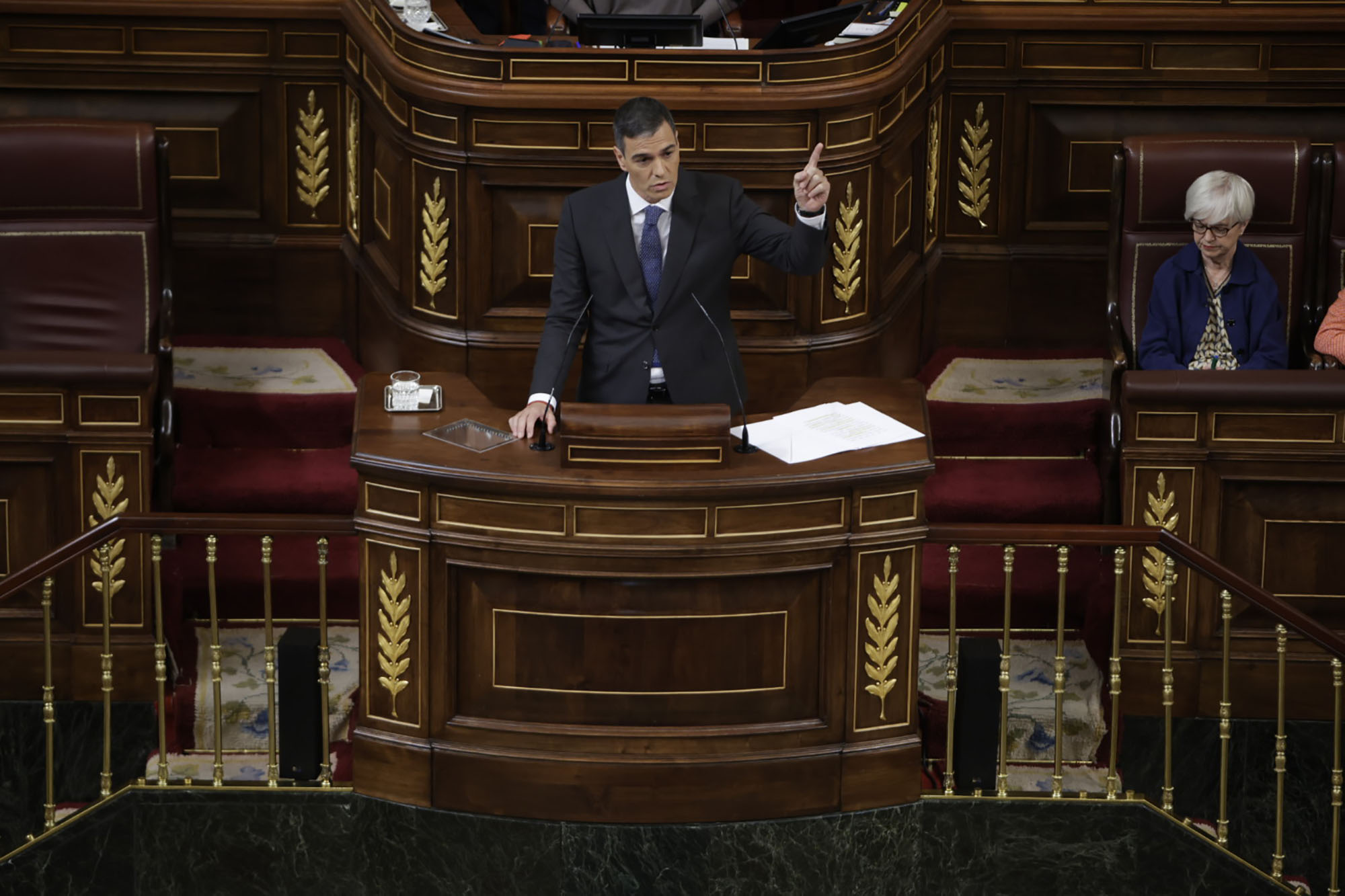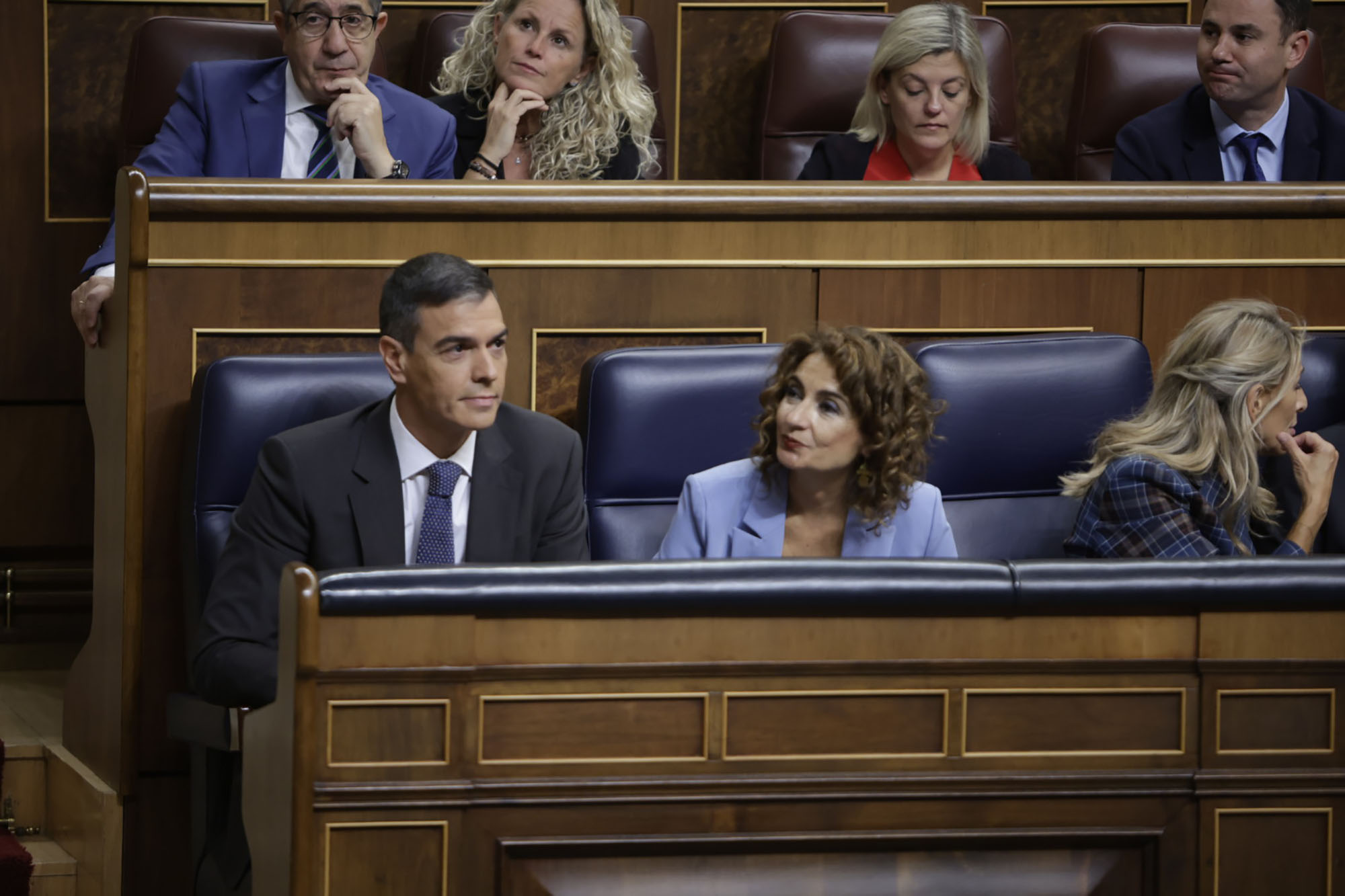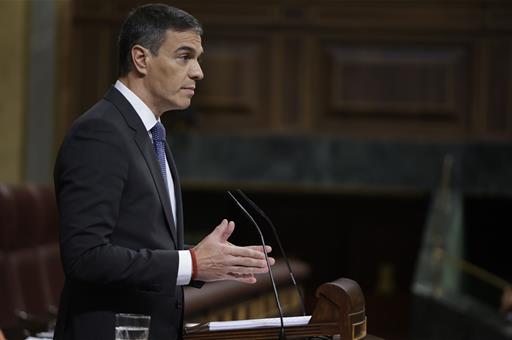Appearance in the Lower House of Parliament
Pedro Sánchez: "Welcoming the outsider is not only a duty, but a step towards guaranteeing the welfare state"
President's News - 2024.10.9
Lower House of Parliament, Madrid
The President of the Government of Spain, Pedro Sánchez, has defended in the Lower House of Parliament the migration policy the executive has deployed in recent years, and has announced measures in this area that are closely linked, according to the leader of the executive, to the demographic challenge and economic growth.
The president assured that the migration policy developed "works", addresses the tensions generated by this phenomenon, and reflects that "welcoming those who come from abroad in search of a better life is not only a duty that international law obliges us to fulfil, but also an essential step to guarantee the prosperity and sustainability of our welfare state".
Pedro Sánchez, who appeared in the Plenary Session of the Lower House at the request of all the parliamentary groups to address the issue of migration, evoked during his speech the history of Spain as a "country of migrants", outlining the challenges posed by this phenomenon and the government's main lines of action in this area.
Tools to meet the demographic challenge
According to the president, effective management of this issue is one of the two tools that will contribute to overcoming the demographic challenge. With a population density below the European average and almost half the municipalities at risk of depopulation, "Spain has both the need and the capacity to integrate", he said.
With regard to the other tool for tackling the demographic challenge, boosting the birth rate, he announced that in the coming weeks the government will try to reach an agreement to approve a new Families Act that "will extend the rights of single-parent families, large families, migrant families, and families with a disabled member".
 The President of the Government of Spain, Pedro Sánchez, during his speech in the Lower House of Parliament | Congreso
The President of the Government of Spain, Pedro Sánchez, during his speech in the Lower House of Parliament | Congreso
Migration policy challenges
In relation to the challenges facing migration policy, the president referred first to the peaks of irregular arrivals, such as the one currently being experienced in the Canary Islands.
Pedro Sánchez recalled that these increases in arrivals to Spanish territory - 50% more in the last year - are common to other entry routes to Europe and can be explained by factors such as instability in the Sahel and the climate crisis. At this point, the leader of the executive conveyed a message of thanks to the people of the Canary Islands for "the daily example of humanity" reflected in their behaviour during the migratory crisis the archipelago is experiencing.
Regarding the need to improve the "effective" integration and "full" coexistence of migrants, the president acknowledged that cultural differences can generate friction, stating that the failure of other countries in this matter should encourage the development of a "successful Spanish model", as has occurred in other areas such as employment and energy.
He also referred to the challenge of misinformation, a problem that "puts at stake tolerance and solidarity as the vectors of our society", and with it, economic prosperity. "In the last ten years, 94% of migrants who have come to Spain have done so in a entirely legal and regulated manner- only 6% have done so in an irregular manner", he recalled. He added that "Spain has to choose between being an open and prosperous country or a closed and poor one".
Axes of migration policy: border reinforcement and reception system
Pedro Sánchez explained that the migration policy of the government over which he presides has been divided into five main lines of action to tackle these challenges, with the reinforcement of borders and the reception system as the first line of action.
The president recalled that in the last six years the number of places in the reception system has increased fivefold to 50,000, the number of National Police and Civil Guard officers in the Canary Islands has increased by 12%, and €35 million have been transferred to the autonomous communities for the care of unaccompanied minors this year alone.
"And in this legislature, we will continue to move in the same direction, with more resources for the State Security Forces and Corps, 6,000 new places in reception centres, and more support for those communities that need it", he said.
Legal, safe and orderly migration
The second axis of the migration policy highlighted by Pedro Sánchez is the strengthening of the instruments that allow legal, safe and orderly migration, because "we know," he assured, "that this is the best way to put an end to irregular migration and the misery associated with it".
Within this strengthening, the President of the Government of Spain highlighted the promotion in the current legislature of the speeding up of the homologation of academic qualifications for those who come to work in Spain, and a new labour migration programme to facilitate hiring at origin in countries such as Mauritania, Gambia, Senegal and Guatemala.
Pedro Sánchez has also announced that next month a reform of the Aliens Regulations will be submitted to the Council of Ministers to streamline the processes for migrants already residing in Spain, and to establish new forms of settlement based on employment and family networks.
 The President of the Government of Spain, Pedro Sánchez, together with the First Vice-President and Minister for Treasure, María Jesús Montero | Congreso
The President of the Government of Spain, Pedro Sánchez, together with the First Vice-President and Minister for Treasure, María Jesús Montero | Congreso
Engaging the EU and boosting integration
As the third axis of migration policy, the chief executive stressed "a policy of co-responsibility and solidarity in Brussels, demanding that the whole of Europe become effectively involved in the management of the migratory flows received by the Mediterranean countries".
To this end, Pedro Sánchez advanced the request to the European Commission to bring forward to the summer of 2025 the entry into force of the border control and migrant distribution tools of the Pact on Migration and Asylum, for which he indicated that NGOs and civil associations will be involved.
As the fourth line of action of the government's migration policy, the president pointed to the integration of immigrants settling in Spain, regarding which he announced the launch in the coming weeks of a national plan for integration and intercultural coexistence. "We will implement integration strategies for inclusion based on human rights and that strengthen a diverse and cohesive Spain," he said.
Aid to countries of origin
The fifth line of action involves continuing to promote the economic development of Latin American and African countries of origin, since "people do not leave their homes because they are given a bed in a reception centre, but because they are fleeing misery and violence, and because they see that there is a future in Spain and Europe".
With this objective in mind, the President of the Government recalled that development aid to the Sahel countries has tripled, and the budget of the Spanish Agency for International Development Cooperation has doubled from €360 to €700 million. The Spain-Africa 2025-2028 strategy has also been promoted, with more than 100 measures to promote economic development in Africa, together with other measures within the framework of the EU and the UN.
"We Spaniards are children of migration; we will not be parents of xenophobia. Let us make a migration policy that our elders can be proud of. And let us create a migration policy that guarantees the future of their grandchildren", concluded the President of the Government.
Non official translation







